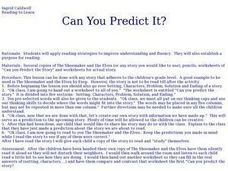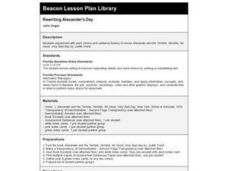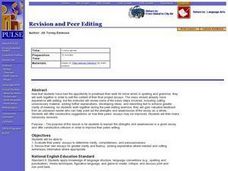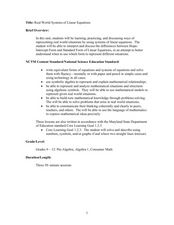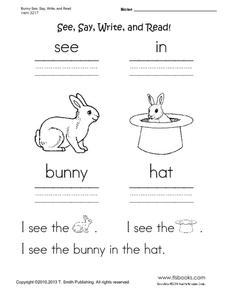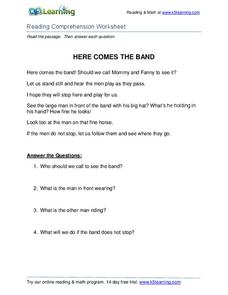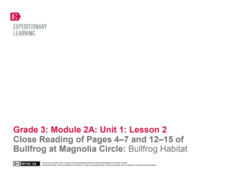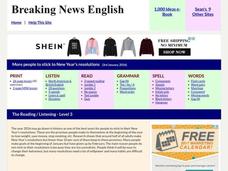Curated OER
Can You Predict It?
Students apply reading strategies to improve comprehension and fluency. They establish a purpose for reading. Students read the The Shoemaker and the Elves by Esop. They go over the setting, characters, problem, solution and ending of a...
Curated OER
Rewriting Alexander's Day
Learners experiment with word choice and sentence fluency to revise Alexander and the Terrible, Horrible, No Good, Very Bad Day by Judith Viorst.
Curated OER
Language Arts: Revision and Peer Editing
Students are able to evaluate their peers' essays to determine clarity, completeness, and persuasiveness. They are able to revise their own essays for greater clarity and fluency, adding explanation where needed and cutting extraneous...
Curated OER
Real World Systems of Linear Equations
Students solve systems of equations with fluency. In this algebra lesson, students graph, use elimination and substitution to solve systems of equations. They identify the point of intersection using algebra.
Curated OER
School-Home Links: Reading 2
In this early childhood reading text worksheet, students read a brief selection with a caregiver, on their own, and to their teacher in order to practice reading smoothly, without stopping.
Curated OER
Bunny See, Say, Write and Read!
Develop the reading, writing, and spelling skills of young learners with a simple worksheet. To begin, children practice reading and writing the words see, in, bunny, and hat, before reading a series of three short sentences using these...
Curated OER
Introducing Powers and Models II: Multiplication Rummy
Students practice their multiplication table using a game to increase speed and accuracy. In this multiplication activity, students distribute 5 random number cards to each player (2-5 players) and they "play" if their hand includes 3...
Curated OER
Number Operations
Students investigate integers and solve problems using integers. In this algebra lesson, students solve problems to help improve speed and accuracy of mental math. They develop a deeper knowledge of the way integers are used on a daily...
K5 Learning
Here Is A Nest
Answer the what, the how, and the why in a reading passage about a hen and her chicks. Readers use the text as a basis for finding the exact answers within the passage.
Library Sparks
When Marian Sang: Reader's Theater
Put on an eight-actor show based on Pan Munoz Ryan's When Marian Sang: The True Recital of Marian Anderson. The resource comes with a color-coded script that includes some images from the picture book.
Lerner Publishing
Meet the Dinosaurs
Take your class of youngsters on a prehistoric adventure with this four-lesson series on dinosaurs. Accompanying the Meet the Dinosaurs books by Don Lessem, these lessons engage children in writing their own dinosaur books, making...
K5 Learning
Treasure Hunt
After reading about a book that leads two friends on a treasure hunt, class members respond to four short answer reading comprehension questions. Skills include describing the characters, retelling the story in their own words, writing...
K5 Learning
Ten Little Cookies
First there were ten cookies and then there were none. Who ate all the cookies? After reading a short poem that counts down from 10 as cookies are eaten, class members respond to four comprehsnion questions.
K5 Learning
Here Comes the Band
Can you hear the men playing in the band? What are they playing and where are they going? These are the main ideas of a brief fictional passage.
K5 Learning
The Bomb
Second graders read a brief passage about King Charles XII of Sweden who lived over 200 years ago. Then, they respond to four short answer questions about what they read.
EngageNY
Close Reading of Pages 4 - 7 and 12 - 15 of Bullfrog at Magnolia Circle: Bullfrog Circle
Scholars take part in a close reading of pages four through seven and 12-15 of the book, Bullfrog at Magnolia Circle: Bullfrog Circle by Deborah Dennard. Readers identify the story's main idea, list its key details, and examine...
Teach It Primary
What Letter Will You Write?
After reading "The Pied Piper of Hamelin," scholars discuss the emotions the events provoked in its characters. In pairs, writers compose a letter depending on the topic and style of their choice then reply to their own or a peer's...
Breaking News English
More People to Stick to New Year's Resolutions
What makes a good New Year's resolution? Practice goal-setting and reading comprehension with a set of language arts activities. English learners work on cloze passages, synonym matches, interviewing exercises, and comprehension...
Hong Kong Special Administrative Region
Learning English through Poems and Songs
Exposing learners to the power of words in poetry is a stimulating way to learn languages. Songs, haikus, rhyming words, and narrative works are all employed in a resource for teaching English as a Second Language.
Curated OER
“THE LORAX” by Dr. Seuss
Few children's books convey the message of conservation as well as Dr. Seuss' The Lorax. Read the story aloud, emphasizing the interconnectedness of plants and animals in an ecosystem and discussing different ways people can help the...
Curated OER
First Mention Rule Worksheet
Learners choose the correct article to fill in the blank before a countable or uncountable noun in a cloze-reading passage. They then determine the rule for the first mention of plural and singular non-count and countable nouns, as well...
EngageNY
Analyzing Character and Theme: Tracking Control in A Midsummer Night’s Dream
Pupils first participate in a drama circle as they continue reading Shakespeare's A Midsummer Night's Dream aloud with classmates. Next, scholars move around and discuss text-dependent questions about the play with a Three Threes in a...
Read Works
Edison Tried and Tried Again
How many times did it take Thomas Edison to invent a successful working lightbulb? Young learners read a short passage about this famous inventor and his determination in getting an idea to work successfully. Then, pupils respond to four...
Curriculum Corner
Digraph Word Sort Recording
Young readers sort their way through a deck of word cards in order to become familiar with four common spelling patterns. Focusing on the ch-, sh-, wh-, and th- consonant digraphs, students draw cards and write each word in the box...
Other popular searches
- Reading Fluency Passages
- Reading Fluency Games
- Sentence Fluency
- Oral Reading Fluency
- Punctuation Reading Fluency
- Improving Reading Fluency
- Reading Fluency Lesson Plans
- Reading Fluency Strategies
- Reading Fluency Worksheets
- Initial Sound Fluency
- Guided Reading Fluency
- Fluency Choral Reading


